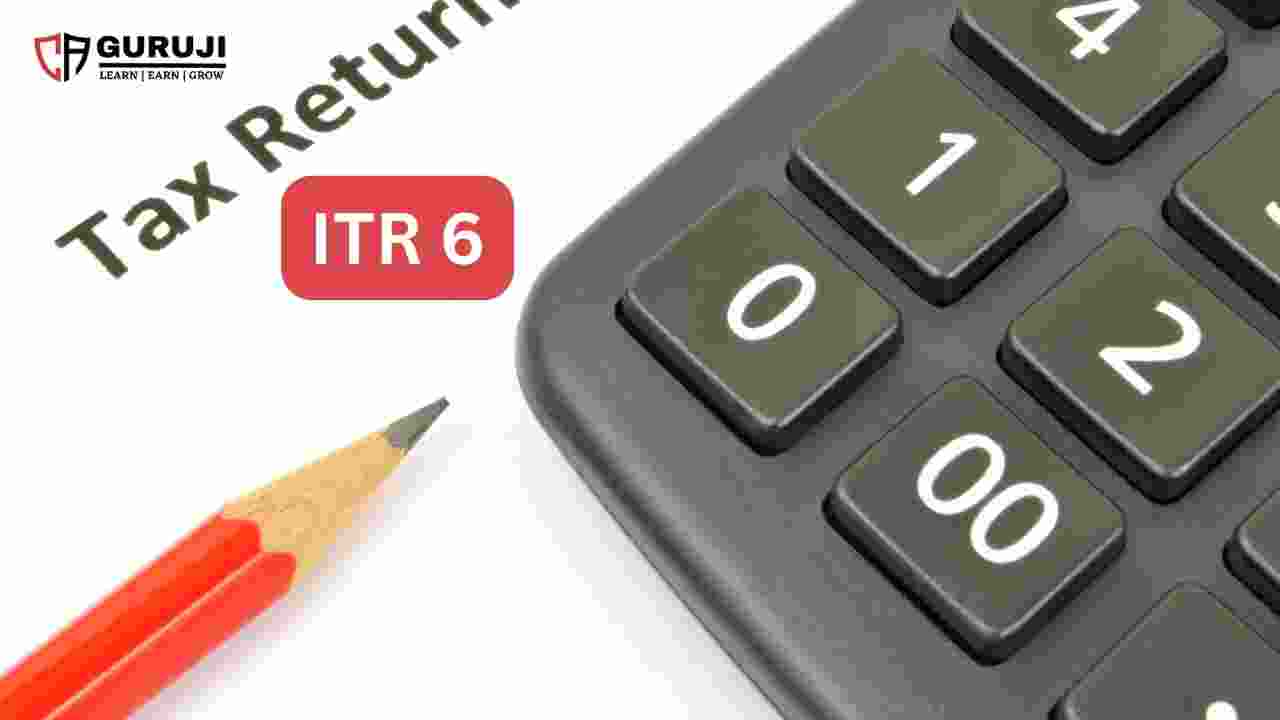The Income Tax Department has introduced various forms tailored for different types of taxpayers. Selecting the appropriate form is crucial as it corresponds to the specific sources of income. Among these forms is the Income Tax Return (ITR) 6, designed specifically for companies. In this article, we’ll delve into all aspects of ITR 6.
When it comes to dividend income, taxpayers are required to pay advance tax only after the declaration or payment of dividends. This ensures that tax payments are aligned with the actual receipt of income. This provision helps in better financial planning for companies and ensures tax compliance in sync with their dividend earnings.
Who is eligible for ITR 6
- Companies: ITR 6 is specifically meant for companies, including those registered under Section 8 of the Companies Act, 2013 (formerly Section 25 of the Companies Act, 1956).
- Exclusions: Certain types of companies are not eligible to file ITR 6. These include companies claiming exemption under Section 11 (Income from Property Held for Charitable or Religious Purposes) and Section 115-O (Dividend Distribution Tax).
- Source of Income: Companies filing ITR 6 should have income from business or profession, irrespective of whether the income is taxable or not.
- Tax Rates: Companies filing ITR 6 are subject to corporate tax rates applicable for the assessment year for which the return is being filed. It’s important to stay updated on the prevailing corporate tax rates.
- Electronic Filing: The Income Tax Department mandates electronic filing (e-filing) for certain categories of taxpayers, including companies filing ITR 6. Therefore, companies falling under this category must file their returns electronically.
- Filing Deadline: As audit is applicable for companies so last date of Audit is 30th September and The deadline for filing ITR 6 is October 31st of the assessment year for which the return is being filed. However, it’s essential to check for any extensions or changes in deadlines announced by the Income Tax Department.
Who is not eligible for ITR 6
- Companies claiming exemption under Section 11: Companies that derive income from property held for charitable or religious purposes and claim exemption under Section 11 of the Income Tax Act are not eligible to file ITR 6. Such entities typically file their returns using Form ITR 7.
- Companies claiming exemption under Section 115-O: Companies that are subject to Dividend Distribution Tax (DDT) under Section 115-O of the Income Tax Act are not eligible to file ITR 6. Instead, they may have different tax obligations and reporting requirements.
- Non-resident companies: Companies that are not considered residents of India for tax purposes are not eligible to file ITR 6. Non-resident companies have different tax treatment and may be required to file their returns using other forms or comply with specific provisions of the Income Tax Act.
- Companies with no business income: ITR 6 is designed for companies with income from business or profession. If a company does not have any business income and only earns income from investments or other passive sources, it may not be eligible to file ITR 6. In such cases, alternative forms or procedures may apply.
- Companies under liquidation or winding up: Companies that are undergoing liquidation or winding up proceedings may have specific tax implications and may not be eligible to file ITR 6. Special procedures and forms may apply in such cases, depending on the stage of the liquidation process and other factors.
- Companies not required to file tax returns: In certain exceptional cases where a company does not meet the threshold for mandatory filing of income tax returns, it may not be eligible to file ITR 6. However, such situations are rare and depend on specific provisions of the Income Tax Act.
What New changes have been implemented in ITR 6 compared to the previous year’s version?
- Details of Legal Entity Identifier (LEI)
- New ‘Schedule 115TD’ inserted for reporting of tax payable on accreted income
- Disclosure of information pertaining to the Capital Gains Accounts Scheme
- New Schedule 80GGC seeks details of contributions made to political parties
- New Schedule 80-IAC seeks details in respect of eligible start-up
- New Schedule 80LA seeks details about the offshore banking unit or IFSC
- Disclosure of the sum payable to MSME beyond the prescribed time limit Section 43B(h)
- Disclosure of winnings from online games chargeable under Section 115BBJ
- Reporting of dividend income derived from a unit located in IFSC
- Company to provide due date for filing of return
- Furnishing of acknowledgement number of the Audit Report and UDIN
- Company recognized as Micro or Small Enterprise
- Furnishing of the reason for tax audit under Section 44AB
What documents are required to file ITR 6?
- Financial statements such as Balance Sheet, Profit and Loss Account, and Cash Flow Statement.
- Details of income earned during the financial year from all sources, including business income, capital gains, rental income, etc.
- Bank statements and copies of supporting documents for all transactions.
- Details of taxes paid, including advance tax, TDS (Tax Deducted at Source), and self-assessment tax.
- Audit reports, if applicable, such as tax audit report under Section 44AB of the Income Tax Act.
- Details of any deductions claimed under various sections of the Income Tax Act
- PAN (Permanent Account Number) of the company.
- Aadhaar card of authorized signatories, if available.
- Any other relevant documents supporting the income, expenses, and deductions reported in the return.
What are the consequences of not filing ITR 6?
- Penalties: Failure to file ITR 6 within the due date specified by the Income Tax Department can result in penalties. As per the Income Tax Act, a penalty of ₹10,000 may be levied for late filing of the return. However, the penalty amount may vary based on factors such as the company’s turnover and the delay in filing.
- Interest Charges: If the company has tax dues and fails to file the return on time, it may be liable to pay interest on the outstanding tax amount. The interest is calculated at the rate specified under the Income Tax Act, and it accrues from the due date of filing to the actual date of filing.
- Loss of Deductions and Exemptions: Delay in filing the return may lead to the loss of certain deductions and exemptions available under the Income Tax Act. Some deductions and exemptions are available only if the return is filed within the due date.
- Legal Consequences: Non-compliance with tax filing obligations may result in legal consequences, including notices, assessments, and legal proceedings initiated by the Income Tax Department. Persistent non-compliance can lead to more severe penalties and legal actions against the company.
- Difficulty in Obtaining Loans and Contracts: Companies that fail to file their returns on time may face difficulties in obtaining loans, credit facilities, or contracts with government agencies or other entities. Many financial institutions and organizations require ITRs as proof of financial stability and compliance.
- Inability to Carry Forward Losses: If the company has incurred losses during the financial year and fails to file the return on time, it may lose the opportunity to carry forward these losses to subsequent years for set-off against future profits.
- Reputation Damage: Non-compliance with tax filing obligations can damage the company’s reputation and credibility among stakeholders, including shareholders, creditors, and business partners. It may also lead to distrust among employees and customers.
F&Q
Is it mandatory to file form 10IB/10IC/10ID within due date to claim the benefit of New Tax
Regime under section 115BA/ 115BAA/ 115BAB respectively ?
Taxpayer is required to file the form 10IB/10IC/10ID within due date as per section 139(1)
to claim the benefit of New Tax Regime under section 115BA/ 115BAA/ 115BAB
respectively.
If the taxpayer has filed Form 10IB each year from the year of opting the same first time, then which Acknowledgement number & date to be mentioned in the return of income?
Filing of any of the forms multiple times (i.e for the same section of taxation) is not expected, if filed in time. However, where such filing has been done for any reasons, taxpayers are required to provide details of latest Form 10IB filed. Same holds good for Forms 10IC & Form 10ID also.
Please ensure that the form is filed within due date u/s 139(1). If the taxpayer has filed the form beyond the due date, the new tax regime is not applicable for that year. Thus, a new form may be filed afresh next year within the due date.
Please note that once opted for new tax regime, taxpayer cannot go out of the same. However, one can move from 115BA to 115BAA/ 115BAB or 115BAB to 115BAA, if other conditions are satisfied.
Can taxpayer file the revised return with New tax regime if the original return is already filed without opting for New Tax Regime ?
Yes. If taxpayer has filed the form 10IB / 10IC / 10ID within due date then the revised return can be filed by opting the new tax regime in the return.
What are the consequences of not filing ITR 6?
Failure to file ITR 6 within the due date may attract penalties and interest charges. It could also lead to difficulties in obtaining loans, facing legal consequences, and losing out on benefits such as carry forward of losses.
Taxpayer is trying to file return after due date by claiming loss from Business & profession which is on account of “Unabsorbed depreciation”. Can the said losses be carried forward to next year ?
If the return is filed after due date, then business loss cannot be carried forward to next year as per the Act.
Further, if the loss from Business & profession is on account of unabsorbed depreciation then the same needs to be reduced from Schedule CFL & to be entered in Schedule UD to carry forward the same to next year. In the next year the brought forward depreciation losses will be adjusted through entries in Schedule UD & Schedule BFLA.
How to disclose the “Amount debited to profit and loss account and disallowable u/s. 37“ reported in the audit report in income tax return ?
In the audit report, auditor is required to report the amount disallowable u/s. 37 at the clause 21(a) and 21(g) of form 3CD. Taxpayer is required to report at least the same amount disallowable u/s. 37 in Sl. No. 7k of Part A – OI of ITR which is reported at the clause 21(a) and 21(g) of form 3CD.
In case, the amount reported in ITR in Sl. No. 7k of PART A – OI of ITR is less than the amount disallowable u/s. 37 at the clause 21(a) and 21(g) of form 3CD then the difference will be added to the total income of the taxpayer.
Similarly, the taxpayer is also required to report at least the same amount in the ITR as reported in audit report for other similar sections which are comparable e.g. 36(1)(ii), 36(1)(iii), 36(1)(va), 37(1), 37(2B), 40(a)(i), 40(a)(ia), 40(a)(ib), 40 (a)(iii), 40(a)(iia), 40(a)(iib), 40(b)/40(ba), 40A(7), 43B, 14A, 41(1), 35(1)(i), 35(1)(ii), 35(1)(iia), 35(1)(iii), 35(1)(iv), 35(2AA), 35(2AB) & 35CCC.
How to disclose the effect on profit due to ICDS & the method of valuation of stock specified under section 145A?
In the audit report, auditor is required to report the “increase in profit”, “decrease in profit”, and “net effect” separately in the columns provided at Sl. No. 13(e) and 14(b). In the return of income at schedule ICDS, the “net impact” on profit due to ICDS adjustments shall be shown separately against each line item. In addition, at schedule OI, Sl. No. 3a the sum of all the positive items of 13(e) and 14(b) shall be shown and at Sl. No. 3b the sum of all the negative items of 13(e) and 14(b) shall be shown. The net difference of 3(a) minus 3(b) is not expected to be less than the difference of all the positive and negative items of 13(e) and 14(b). It is seen that some of the
adjustment items of schedule BP are a repeat item in ICDS adjustments also and are separately identifiable.
Example. “Adjustments due to depreciation”. The impact of such adjustments having dual / multiple impact may be reported using other appropriate columns of schedule BP, to nullify the impact of dual/ multiple adjustment.
What precautions to be taken to claim TDS/TCS deducted/collected in the hands of others ?
To claim TDS/TCS deducted/collected in the hands of other person, kindly ensure that the same
details of TDS/TCS deducted/collected are also mentioned in the other person’s return of income
and same has been given away by the other person in his ITR.
Further ensure that the ITR of the other person is filed before filing your ITR.
If MAT provisions are applicable, which schedules are required to be filled ?
If the MAT provisions are applicable to the Company, both the schedules MAT & MATC are required to be filled in the return of income
Taxpayer is not able to file ITR-6 and getting the error that “Dear Taxpayer, ITR-6 is not applicable as per the status of the PAN. Kindly verify the same & file applicable ITR”.
ITR-6 can be filed by the taxpayers whose status as per PAN data base is company. Thus, if the taxpayer’s status requires to use other ITRs, using ITR 6 by such assessee may render the return invalid. Therefore, from AY 2023-24,
E-filing has taken extra measures to stop such statuses from using wrong form (ITR-6 in this case) in order to help tax payers with this avoidable mistake. However, if the status in the PAN data base is not correct, thereby using ITR 6 would be required, such taxpayers may reach out to E-filing in advance & report the requirement under ENivaran with necessary supporting documents, so that E-filing may provide appropriate enablement
Can a company file ITR 6 after the due date?
Yes, a company can file ITR 6 after the due date, known as a belated return. However, this may attract penalties and interest charges, and certain deductions and exemptions may not be available.
Is it mandatory to e-file ITR 6, or can it be filed manually?
For certain companies falling under mandatory tax audit provisions or those claiming a refund, e-filing of ITR 6 is mandatory. Others have the option to file manually.
Are there any prerequisites for filing ITR 6?
Yes, before filing ITR 6, the company must ensure that all tax liabilities are paid, necessary audits are completed, and all relevant financial documents and information are ready
Can a company claim deductions and exemptions while filing ITR 6?
Yes, a company can claim deductions and exemptions available under the Income Tax Act while filing ITR 6, including deductions for investments, expenses, and incentives for specific industries.
You can contact team of Tax Experts at 9150010300 or visit www.legalsahayk.com
💁🏼 Learn GST, Income Tax, ITR, Accounting, Tally, Trademark, TDS Returns: https://cagurujiclasses.com 📞 Call at 9150010400 (only for courses)
Visit www.cagurujiclasses.com for practical courses











